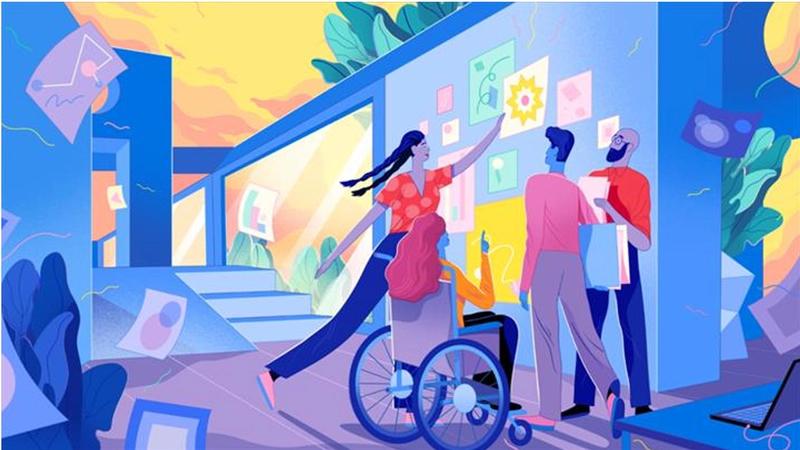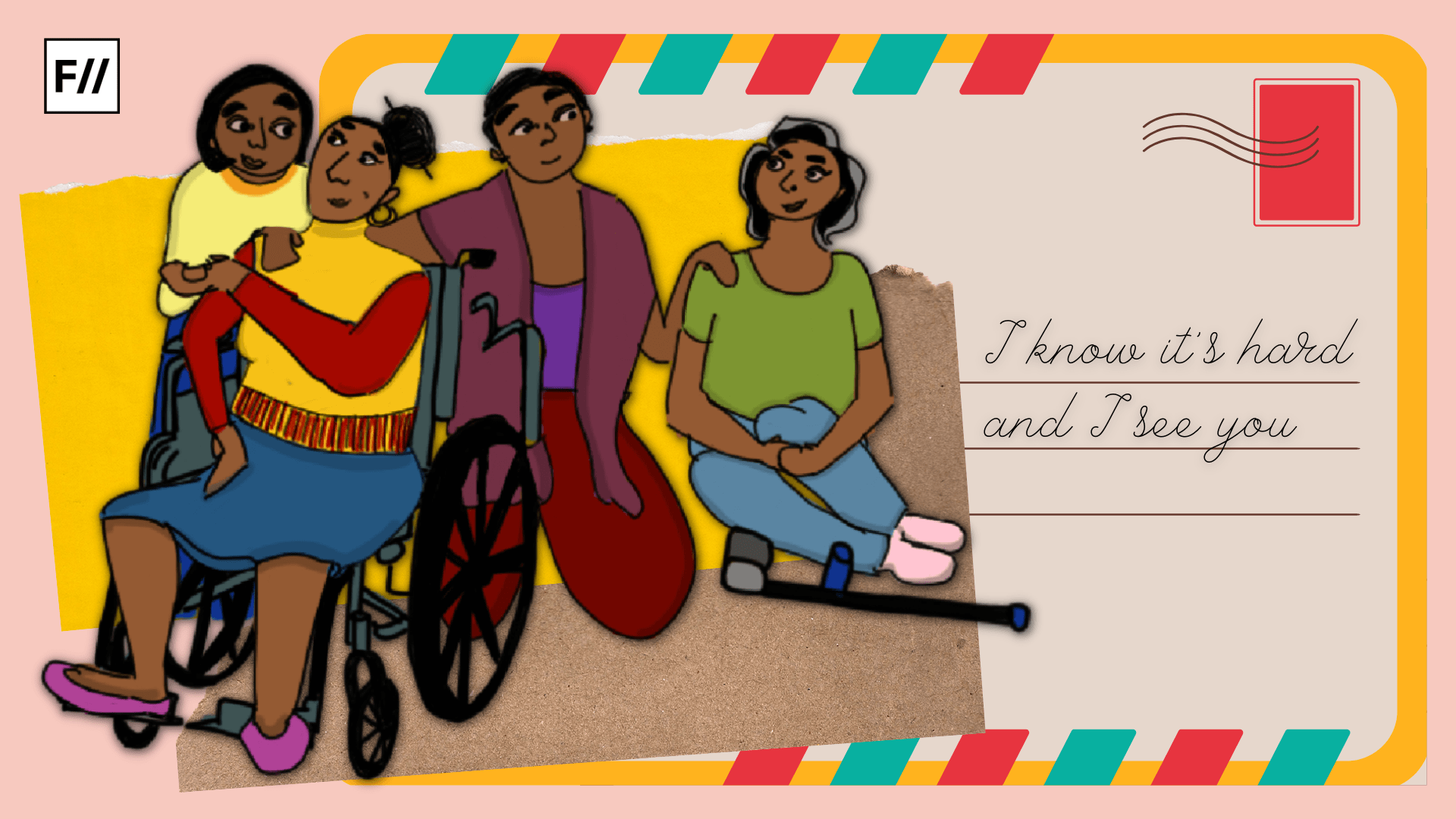Editor’s Note: FII’s #MoodOfTheMonth for February, 2022 is Redefining Love. We invite submissions on the many layers of love, throughout the month. If you’d like to contribute, kindly email your articles to sukanya@feminisminindia.com. This article is part of Cripplentine’s Day, a project by Revival Disability Magazine in collaboration with Feminism In India rooted in the belief that all kinds of love should be celebrated because love is a disabled and queer revolution. An accessible Valentine’s Day should be one that not only includes an able-bodied kind of love between two heteronormative lovers. As a part of the project, Revival Disability Magazine publishes a series of articles on the theme. The theme of Cripplentines Day this year is on what disabled women, trans and no binary folx think about pleasure and how has it changed during the pandemic – how have they coped, in a sense with loneliness and isolation.
Posted by Kim Fernandes
In year three of this seemingly endless pandemic, when things barely come together each day, I am surprised by how much love has accumulated, by its stubborn persistence when I have least expected it. “This must have been so hard for you,” a friend muses, “To sit at home all day and worry about catching COVID. What are the things you feel like you can safely do?”
Being immunocompromised and disabled, I want to respond, “Not a lot, to be honest“. Every social thing I’ve held dear has vanished into thin air over the last couple of years. I’m particularly frustrated that each time I’ve started to feel ready to move towards some semblance of normal, maybe even to go out and be my fully extroverted self again, we’re on the brink of another wave, another reminder that the pandemic is not over (even when we’d like to think it is).
Holidays and other celebrations have felt acutely lonely, not so much for a lack of people in my life, but because I know it’ll quite likely be a long time before the work of making in-person plans no longer seems like an unbearably heavy decision.

The thought of moving from my 20s into my 30s was terrifying, marked in my mind only by the fact that my body would deteriorate more than I could fully plan for. What I had not been able to articulate then was that I would also grow with my beloved community, coming to inhabit a life that was full to bursting with care and support for each other. This ode is to the spaces that aren’t often thought of as love, to the relationships that make up the thickest everyday pleasures but are still thought of within very heteronormative framings as secondary to having a single, long-term partner
I have felt persistent discomfort with the idea of a valentine for longer than I can articulate. Many of the ideas of relationships that I’ve grown up around have felt particularly constraining, their beginnings and ends all the same, pointing to a cisgender, heteronormative vision of the world that follows more or less the same template.
With each year of growing away from these ideas, I realize that I am none of these things – I am nonbinary, panromantic, asexual, and lots of other words in a language where I have barely developed a full grammar of being. In ways that I am only just coming to articulate, I am often living a life that feels at odds with the templates I was once handed – one of them being the idea of loving a single person as a romantic partner, and that being the most important kind of love.
To pour all of one’s energies into expecting that a single person be your person has never worked for me; it seems to make so much more sense, instead, to build worlds that are plentiful in their love, making room for all kinds of love even if the ways to name them are yet to come. What might it mean to love expansively, to have your heart split open from how love you give and are shown? The more I think about it, it is about both coming to love oneself but also being open to more kinds of love than can be named.
Also read: Taking Up Space: Redefining Dating & Beauty Standards As A Disabled Woman
For at least the last decade, regardless of where in the world I am, a dear friend’s birthday has fallen on Valentine’s Day each year. This has (at least pre-pandemic) meant elaborate dinners, sometimes weekends away, birthday celebrations that are tender, indulgent and filled with the gentle gratitude of getting to spend this time with each other.

We’ve never said, “I have Valentine’s Day plans,” because we are each other’s Valentine’s Day plans, decided a year in advance or more, together with the unspeakable relief of not having to find other things that fall in place for this one specific, terribly mainstream day. We’re not the people queuing up to buy a bouquet of roses and a box of chocolates, we think gratefully.
But more importantly, we are definitely the people choosing to love each other silly, to send postcards even on the Valentine’s Days that don’t have birthday dinners slotted in, to share long essays that say hey, this reminded me of you.
I cannot imagine who I would have grown into without these deep, loving friendships, ones that have made room for me entirely as I am, and I am so glad I don’t have to. There’s a certain sweet relief in starting to talk about an incident without needing to provide much of the context around it, in being able to name what feels strangely ableist and have it be affirmed, in supporting and being supported through days that drag on
This is an ode to crip friendship, a love letter to the stuff that fills up my days in a life that is rich beyond my wildest imagination. When I was younger, before I came to inhabit fully what it meant to be crip and to be in community with others who so lovingly held me, I felt a lot of grief and worry for what a life with degenerative illnesses would look like.
The thought of moving from my 20s into my 30s was terrifying, marked in my mind only by the fact that my body would deteriorate more than I could fully plan for. What I had not been able to articulate then was that I would also grow with my beloved community, coming to inhabit a life that was full to bursting with care and support for each other. This ode is to the spaces that aren’t often thought of as love, to the relationships that make up the thickest everyday pleasures but are still thought of within very heteronormative framings as secondary to having a single, long-term partner.

I am asked often, for example, what kinds of plans my partner and I have made around anniversaries and birthdays, and of course things like Valentine’s Day. I am almost never asked what kinds of worlds my friends and I are dreaming into being, not just in the times we send each other morning messages wishing we didn’t have to go to work, but also in the times we are able to hold space for each other, to say, I know it’s hard and I see you, in the most consistent, kind ways.
I cannot imagine who I would have grown into without these deep, loving friendships, ones that have made room for me entirely as I am, and I am so glad I don’t have to. There’s a certain sweet relief in starting to talk about an incident without needing to provide much of the context around it, in being able to name what feels strangely ableist and have it be affirmed, in supporting and being supported through days that drag on.
Also read: People-pleasing As A Survival Tool For A Disabled Woman Navigating Intimacy
Kim (they/them) is a disabled researcher, writer and educator. They are interested in gender, technology and disability. Kim is also a part of the Revival Disability Collective. They are on Twitter and Instagram as @kimmerrlee
Featured Illustration: Ritika Banerjee for Feminism In India
About the author(s)
Revival Disability Magazine is a digital media project on Disability, Sexuality and Intersectional Ableism for disabled and queer folks, by disabled and queer folks. Revival is a revolution of the disabled self to re-claim and re-define stories of disability in India, through first person narratives of lived experiences and creating an accessible queer utopia echoing the vision of for inclusion and accessibility.




